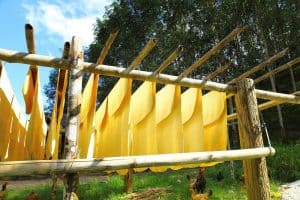The Policy Components were approved as part of a resolution for the endorsement of a GPSNR policy framework for natural rubber production and sourcing for ordinary member companies.
A booklet containing the Policy Components can be found here.

The Policy Components were approved as part of a resolution for the endorsement of a GPSNR policy framework for natural rubber production and sourcing for ordinary member companies.
A booklet containing the Policy Components can be found here.

The first draft of the “desired state” document has been shared with the Executive Committee in their monthly meeting in June for further consultation. To avoid overlooking any important steps and details necessary for the development of strategies and objectives, a terms of reference was also created by the Working Group and approved by the Executive Committee, defining the scope, objectives, and outcomes which will be enabled by the process.
The completion of the “Theory of Change Workshop” in March, where the group met in Singapore to collaborate on building out “What Good Looks Like” when it comes to sustainable natural rubber, contributed to the start of the work on the “Theory of Change” for natural rubber, a process aimed at identifying the root causes for the current state of the natural rubber industry as well as identify the Key Strategies that the Working Group believes the platform should start working on.
Currently, the Working Group is in the process of finalizing the recommendations for launching these strategies, including timelines for implementation in 2019/2020. The focus for the next 6 months will be on launching and pursuing three main strategies: 1) Sustainability Policy Tool Box and Best Practices; 2) Capacity Building for Smallholders and Rubber Plantations to support the incorporation of more sustainable practices; 3) Improving Transparency and Traceability within the Natural Rubber Supply Chain.
We would like to thank the members who participated and encourage all others to actively participate in the Working Group’s undertakings. In order to meet the high expectations set for GPSNR, we need members to attend the meetings frequently, participate consistently, and contribute in a timely manner.

Natural rubber faces a similar set of environmental, social and economic issues as other agricultural commodities such as palm oil, but the spotlight on sustainability has only been recently turned towards this key raw material, 70% of which goes into tire production. The launch of GPSNR marked a significant step towards developing sustainable standards for natural rubber, with member organizations making a commitment to 12 Sustainable Natural Rubber Principles.
The Policy Toolbox Working Group was established to develop a guiding framework for GPSNR members to implement policies and practices that align with the 12 Principles. Two key documents, the Policy Components and Baseline Reporting Requirements, have emerged after a year of discussion and drafting.
The Policy Components outline specific commitments that GPSNR company members should include in their sustainable natural rubber policies, while the Baseline Reporting Requirements indicate qualitative and quantitative sustainability data to be reported to the Secretariat for the first year of reporting.
A members webinar was held on 16 June, where the Co-Chairs of the Policy Toolbox Working Group explained the purpose, process and next steps surrounding the two documents.
Several members have volunteered to participate in an ongoing pilot testing of the Baseline Reporting Requirements. The goal of the pilot is to refine and finalize the Baseline Reporting Requirements based on company feedback.
The proposed Policy Components and Baseline Reporting Requirements are now open for member consultation until 3 July 2020.
All GPSNR members are invited to download the draft documents from the links below and submit your feedback by accessing this link.
Additionally, you may view the recording and slide deck of the 16 June webinar from the links below.
Download Baseline Reporting Requirements
© 2022 All rights reserved
Global Platform for Sustainable Natural Rubber

| Cookie | Duration | Description |
|---|---|---|
| cookielawinfo-checkbox-advertisement | 1 year | Set by the GDPR Cookie Consent plugin, this cookie is used to record the user consent for the cookies in the "Advertisement" category . |
| cookielawinfo-checkbox-analytics | 11 months | This cookie is set by GDPR Cookie Consent plugin. The cookie is used to store the user consent for the cookies in the category "Analytics". |
| cookielawinfo-checkbox-functional | 11 months | The cookie is set by GDPR cookie consent to record the user consent for the cookies in the category "Functional". |
| cookielawinfo-checkbox-necessary | 11 months | This cookie is set by GDPR Cookie Consent plugin. The cookies is used to store the user consent for the cookies in the category "Necessary". |
| cookielawinfo-checkbox-others | 11 months | This cookie is set by GDPR Cookie Consent plugin. The cookie is used to store the user consent for the cookies in the category "Other. |
| cookielawinfo-checkbox-performance | 11 months | This cookie is set by GDPR Cookie Consent plugin. The cookie is used to store the user consent for the cookies in the category "Performance". |
| PHPSESSID | session | This cookie is native to PHP applications. The cookie is used to store and identify a users' unique session ID for the purpose of managing user session on the website. The cookie is a session cookies and is deleted when all the browser windows are closed. |
| viewed_cookie_policy | 11 months | The cookie is set by the GDPR Cookie Consent plugin and is used to store whether or not user has consented to the use of cookies. It does not store any personal data. |
| Cookie | Duration | Description |
|---|---|---|
| ac_enable_tracking | 1 month | This cookie is set by Active Campaign to denote that traffic is enabled for the website. |
| Cookie | Duration | Description |
|---|---|---|
| _ga | 2 years | The _ga cookie, installed by Google Analytics, calculates visitor, session and campaign data and also keeps track of site usage for the site's analytics report. The cookie stores information anonymously and assigns a randomly generated number to recognize unique visitors. |
| _gat_gtag_UA_139883466_1 | 1 minute | Set by Google to distinguish users. |
| _gid | 1 day | Installed by Google Analytics, _gid cookie stores information on how visitors use a website, while also creating an analytics report of the website's performance. Some of the data that are collected include the number of visitors, their source, and the pages they visit anonymously. |
| CONSENT | 2 years | YouTube sets this cookie via embedded youtube-videos and registers anonymous statistical data. |
| Cookie | Duration | Description |
|---|---|---|
| NID | 6 months | NID cookie, set by Google, is used for advertising purposes; to limit the number of times the user sees an ad, to mute unwanted ads, and to measure the effectiveness of ads. |
| VISITOR_INFO1_LIVE | 5 months 27 days | A cookie set by YouTube to measure bandwidth that determines whether the user gets the new or old player interface. |
| YSC | session | YSC cookie is set by Youtube and is used to track the views of embedded videos on Youtube pages. |
| Cookie | Duration | Description |
|---|---|---|
| AWSALBTG | 7 days | No description available. |
| AWSALBTGCORS | 7 days | No description available. |
| FORMASSEMBLY | session | No description available. |
| GetLocalTimeZone | session | No description |
| prism_650657595 | 1 month | No description |